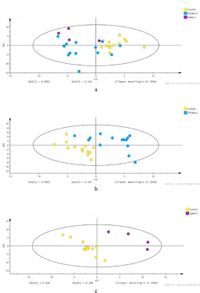A recent study published in Scientific Reports expands the understanding of metabolic dysregulation in Hashimoto’s thyroiditis (HT) by unveiling distinct metabolic profiles linked to the presence of thyroid autoantibodies. Specifically, the research highlights how thyroid peroxidase antibodies (TPOAb) and thyroglobulin antibodies (TgAb) influence metabolic pathways, providing new insights into this common autoimmune disorder, which predominantly affects women.
Conducted by researchers at the Second Hospital of Dalian Medical University, the study analyzed serum metabolic profiles from female patients with HT—14 of whom tested positive for TPOAb, 4 for TgAb, and 14 healthy controls. A total of 225 metabolites were evaluated using advanced liquid chromatography-mass spectrometry (LC-MS), revealing significant metabolic differences among the groups.
Through Partial Least Squares Discriminant Analysis (PLS-DA), the scientists identified 36 key metabolites that were significantly altered based on antibody positivity. Notably, 13 metabolites differed between the TPOAb-positive group and healthy controls, while 23 differed when comparing the TgAb-positive group to the controls. The results underscore the implications of autoantibody status in shaping metabolic disturbances.
One of the significant findings of this research was the correlation between specific metabolites and antibody levels. The authors noted a moderate positive association between TgAb and phenylacetyl-L-glutamine, while indicating a strong relationship between TPOAb and lysophosphatidylcholine (LPC) 16:0 sn-1. These correlations suggest that the presence of these antibodies may influence metabolic processes distinctly.
Moreover, metabolic pathway analysis indicated that TPOAb-positive patients exhibited significant activation of pathways linked to glycine, serine, and threonine metabolism, whereas the TgAb-positive group showed enhanced activity in galactose metabolism. This differentiation not only sheds light on the biochemical landscape associated with HT but also suggests potential biomarkers for monitoring the condition.
With autoimmune conditions like Hashimoto’s thyroiditis on the rise, understanding these metabolic profiles is crucial. Epidemiological evidence indicates that women face higher rates of HT, and factors such as altered metabolism can affect overall health outcomes. The findings from this study align with previous research noting associations between thyroid autoimmunity and metabolic disorders, such as obesity and dyslipidemia.
In their paper, the authors remarked, "TPOAb and TgAb positivity are associated with distinct metabolic profiles, reflecting their differential roles in metabolic pathways linked to Hashimoto’s thyroiditis." This statement encapsulates the core discovery that advancing clinical understanding can improve management strategies for patients suffering from this chronic condition.
Research thus far has predominantly focused on how thyroid hormones impact glucose and lipid metabolism, leaving the effects of thyroid autoantibodies largely underexplored. The study by Luo et al. paves the way for further investigations by laying the groundwork for exploring the mechanistic roles of TPOAb and TgAb in metabolic dysregulation.
While the study offers compelling insights, it is essential to acknowledge its limitations. The sample size remains relatively small and lacks male participants, indicating that future studies should aim for broader demographic inclusivity to reinforce and validate these findings.
In conclusion, this pioneering study illustrates the diverse metabolic alterations presented by differing antibody positivity in female patients with Hashimoto’s thyroiditis. By enhancing the understanding of autoimmunity’s impact on metabolism, the research not only contributes to the scientific literature but also hints at potential developments in patient monitoring and treatment protocols. The hope is that these initial findings will spur larger, more comprehensive studies to explore these metabolic dynamics.

